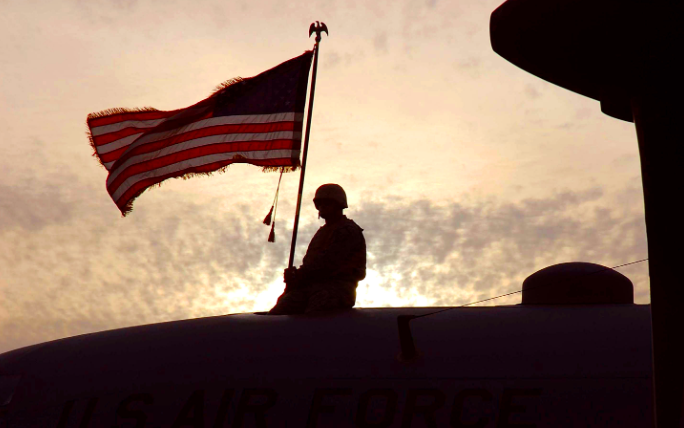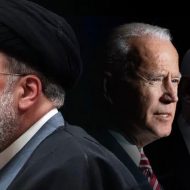While militarism is prevalent across US society, the idea of a new, big confrontation between superpowers seems quite unrealistic for contemporary America.
Our grandparents told us stories of the Second World War. All four of my own had participated in some capacity. The Second World War was not a “regime change” operation carried out under the guise of humanitarianism. The Second World War was a battlefield clash between two global alliances that sought to destroy each other. The war involved mass mobilizations of the population. In order to achieve victory, the Soviet Union, the United States and Britain were forced to put society under the most ironclad discipline.
In the USA, children collected scrap metal and watched the skies for Japanese planes. The population had “meatless Tuesdays” prioritizing agricultural products for the front-lines. The automakers put commercial cars on hold and manufactured military vehicles instead. Japanese-Americans were interned in prison camps. The Trotskyite Communists who opposed the war, along with fascist sympathizers like the German-American Bund, were locked in prison or detained by federal authorities, and every able bodied young man was required to join the military. The entire country was mobilized for victory, and victory was achieved.
Would such a thing be possible today?
No war since the the Second World War has been anything like it, despite the fact that US leaders constantly invoke it. World War Two analogies are almost a trade-mark staple of neoconservatism. George H.W. Bush compared Saddam Hussein to Hitler while inciting the US public to support “Operation Desert Storm.” Cable News endlessly brought up the Second World War when his son, George W. Bush, invaded Iraq. Reagan’s invasion of Grenada, Clinton’s bombing of Serbia, the NATO intervention in Libya, and continued US support for extremists in Syria, all have come with rhetoric invoking World War Two.
Yet none of these countries are military superpowers trying to take over the world. By 1939 the Nazis had turned their country into a military powerhouse ready to roll across “Fortress Europe” and crush millions of lives. They had a plan for world conquest. Comparing Iraq, Libya, Afghanistan, Serbia, Grenada, or Panama to the Third Reich is almost laughable. These anti-imperialist governments across the developing world wanted to sell oil on the international markets and build infrastructure. They may have clashed with their neighbors, but world domination was not on their agenda.
Vietnam Syndrome, Kicked?
None of these wars were declared by the US Congress under the constitutional procedure. They were “operations” “police actions” or “interventions” ordered by the executive branch, and perhaps approved in a congressional resolution. But these were not “wars” in the full on, legal sense. Everyday Americans were asked to put up yellow ribbons and “support our troops” bumper stickers, but aside from that, American civilians were left to live a normal life, as they watched TV reporters “embedded” in order to repeat the Pentagon narrative.
The US government learned the hard way after World War Two that “big wars” were just not going to work anymore. Toward the end of Korean War of 1950-1953, the population seemed to be losing enthusiasm. The anti-communist fanaticism that accompanied this war faded, and by 1954, Joe McCarthy had fallen out of favor with the US public.
The political crisis sparked by the Vietnam War still haunts the memory of the US public. Young people burned their draft cards. Soldiers shot their officers. By the time the USA withdrew, insubordination was widespread among the military itself. Peace marches were massive, and public opinion was completely opposed to further military involvement. Urban rebellions shook the Black community, and violent protests rocked the college campuses.
The wars in Vietnam and Korea, with military conscription and significant US casualties may have been experiments with “big war” tactics, but they both flopped. Korea ended in a “stalemate” armistice, with a US Army General actually being captured in the process. When China decided to get involved, and MccArthur’s threats of nuclear attack didn’t deter them, the USA began to sweat. Vietnam was a military defeat for the United States, with the National Liberation Front effectively unifying the country and giving birth to the Socialist Republic of Vietnam.
After sending US forces to Kuwait to push out Iraqis, George H.W. Bush declared: “by God, we’ve kicked the Vietnam syndrome once and for all.” The phrase “Vietnam Syndrome” referred to the US public’s lack of enthusiasm for war following the 1970s.
Despite Bush’s claim that Vietnam Syndrome has been “kicked,” the US public doesn’t seem enthusiastic about wars at this point, and observers have noted that the country hasn’t clashed directly with a rival superpower since 1945. While the United States has the largest military budget in the world, the governments it has selected for attack are all in a much lower weight class.
USA Faces Internal Problems
Now, as US leaders beat the drums against the two Eurasian Superpowers, an unacknowledged truth hides behind the threats and heated words. Russia and China are both highly disciplined, well organized societies. The population marches behind the government and the military in order to achieve its goals even in peace time. Both countries have economies that are centered around the state.
Meanwhile, in the United States, different agendas seem to be everywhere. Political and regional divisions are getting deeper. Different wings of the “deep state” seem to be at each other’s throats with different agendas and goals.
Furthermore, the idea of putting the millions of millennial and “Generation Z” youth into uniforms and on to the battlefields is somewhat laughable. These generations are loaded with cynicism, mistrust, and many of them have a real distance from the ugly realities of violence in their every day life.
Schoolchildren in the USA are no longer even permitted to defend themselves in schoolyard scuffles, but required to passively accept the blows of assailants while calling for help from police or teachers. In most American schools if a child so much as raises a fist in self-defense, he can expect the same punishment as his attacker.
In the new police state that is unfolding, Americans are increasingly taught to be passive, non-confrontational and obedient. Police in uniforms, security cameras, and employers watch their every move. “Abusive” or “insensitive” language on social media can result in academic or workplace penalties. As authoritarianism increases in US society, so does a kind of “touchy feely” niceness that doesn’t breed good soldiers.
The US military already relies on a large number of “green card soldiers” i.e. non-citizen immigrants who fight in order to earn legal status in the country. Much like the Saudi military, which is not exactly winning in Yemen, the US military is increasingly made up of people from other countries, bribed to fight our wars on our behalf.
Perhaps it is the huge leap in the US standard of living that followed the Second World War, which made the public less enthusiastic about military conflicts. Wealth comes with comfort, and those who live comfortable lives tend to be far less willing to march off into battle.
Or perhaps it is the fact that the country which called itself “the sole remaining superpower” has stretched its economic tentacles all across the planet. When the US economy is the central part of a huge, global market, with so many different corporations, with so many different short term interests, it is pretty hard for the state declare a single enemy and unify the country to direct its energy toward a single goal.
Regardless, it is safe to say that a new “great war” in which the USA faces off with “someone its own size” isn’t quite realistic in 2018. However, short, quick “regime change” wars against third world nationalists seem to still be in fashion. Yet, the increasing power of Russia and China on the global stage has made it a lot more difficult.









Leave a Reply